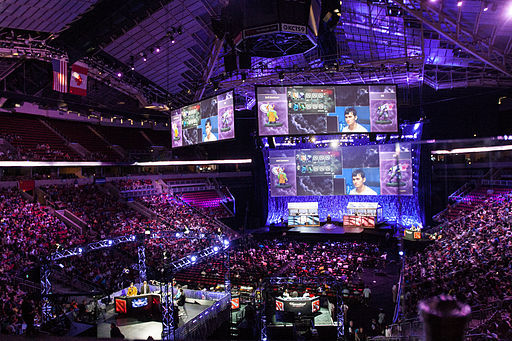 Esports is a truly global phenomenon, with some analysts estimating worldwide viewership at approximately 300 million, potentially rising to 500 million by 2020. With so many eyeballs on esports – and with so many of those eyeballs being in a millennial category that is young, affluent, globalized, and technologically-driven, but increasingly challenging for brands to engage with – esports presents an exciting opportunity for sponsors. And, as with any other sport, esports sponsorship agreements can be a significant revenue generator for rights holders.
Esports is a truly global phenomenon, with some analysts estimating worldwide viewership at approximately 300 million, potentially rising to 500 million by 2020. With so many eyeballs on esports – and with so many of those eyeballs being in a millennial category that is young, affluent, globalized, and technologically-driven, but increasingly challenging for brands to engage with – esports presents an exciting opportunity for sponsors. And, as with any other sport, esports sponsorship agreements can be a significant revenue generator for rights holders.
Indeed, now is a particularly exciting time for esports sponsorship. Until fairly recently, sponsorship agreements within esports was dominated by brands endemic to the gaming industry – software and hardware developers such as Intel, Logitech and Turtle Beach. However, non-endemic brands have now started to enter the esports sponsorship market in a big way, with the likes of Astralis and SK Gaming entering into high six-figure sponsorship agreements with Audi and Visa, respectively Does this signal the start of a wave of deals that could see esports brands competing with household names from traditional sports in terms of sponsorship value?
When entering into an esports sponsorship arrangement, both rights holders (whether they be players, teams, tournament organizers or games publishers) and sponsors face many of the same issues that the parties to a deal in traditional sports do. Issues such as exclusivity, territory, limiting liability and payment are common across the board. This article is instead focused on a handful of issues that are of particular concern to those looking to take the leap into esports sponsorship, no matter on which side of the table they sit.
What’s for sale?
One of the most exciting aspects of the esports industry is the fact that it’s moving so quickly; but the shifting sands of the esports world present challenges as well as opportunities. Team rosters fluctuate frequently, with star players changing hands on short notice. Accordingly, the fortunes of teams ebb and flow dramatically, as a championship-winning team one year might be relegated the next. Teams leave and join new leagues and competitions regularly, whilst the basic structures of the leagues and competitions themselves can look significantly different from season to season.
Some publishers and tournament organizers are now taking action to try to create greater stability in the esports commercial market. For example, in May 2017 Riot Games Inc., owner of leading esports title League of Legends, unveiled a new franchise model for its North American League Championship (NA LCS) that greatly reduces the likelihood of relegation and grants teams a multi-year license to compete (at a rumored cost of $10million per season for each team). Teams competing in the NA LCS’s European counterpart are reportedly requesting similar changes to their format.
However, rights holders and sponsors should also take contractual measures to ensure that they don’t leave themselves exposed. If a deal is contingent on a particular player continuing to be part of a team, a team continuing to play a particular game, or a tournament continuing to be played in a particular region, it is sensible to look at the grant of rights, consideration and termination clauses with particular care.
Who owns the rights?
Intellectual property rights are complex in esports. Whilst publishers own the underlying IP in the relevant game, the licensing arrangements under which tournament organizers, teams and players are permitted to use it, and the position as to who owns copyright in broadcast material (among other things), will vary significantly on a case-by-case basis.
Separately, as a rights holder, do you have appropriate trade mark registrations in place in the applicable territory for your team name or tournament logo? The same applies for sponsors – esports is a global game; are your protections sufficiently robust in key territories to enter into the deal?
Accordingly, both parties should be keenly aware of the IP protection that they give and ask for in their sponsorship agreements – IP warranties and indemnities, as well as approval processes for use of IP, should be given detailed attention.
The other side of brand protection
Esports is professionalizing rapidly. Whether through the standardization of rules and regulations, or the increase in regulatory intervention into the esports betting market, even within the past six months the industry has moved on significantly. However, given the globalized, instant and platform-pervasive nature of esports, as well as the level of (relatively autonomous) online media activity of players, reputation-damaging incidents do sometimes occur. Incidents involving PSV and Toronto esports players provide recent and unfortunate examples. In light of this, the parties to an esports sponsorship agreement need to be mindful of reputational issues outside of IP infringement, and how to address these contractually.
Getting the deal done
The above should give a flavor of some of the key issues to take into account when trying to get an esports sponsorship deal over the line. The final one, though, is to make sure to get it properly documented. With sponsorship values increasing, and deals extending from single seasons to four or five, it has never been more important to make sure that agreements reached at a meeting or over email are put down on paper. By doing so, both rights holders and sponsors can build lasting relationships and make the most out of the tremendous opportunities presented by the esports industry.

![[IPWatchdog Logo]](https://ipwatchdog.com/wp-content/themes/IPWatchdog%20-%202023/assets/images/temp/logo-small@2x.png)

![[Advertisement]](https://ipwatchdog.com/wp-content/uploads/2024/04/Patent-Litigation-Masters-2024-sidebar-early-bird-ends-Apr-21-last-chance-700x500-1.jpg)

![[Advertisement]](https://ipwatchdog.com/wp-content/uploads/2021/12/WEBINAR-336-x-280-px.png)
![[Advertisement]](https://ipwatchdog.com/wp-content/uploads/2021/12/2021-Patent-Practice-on-Demand-recorded-Feb-2021-336-x-280.jpg)
![[Advertisement]](https://ipwatchdog.com/wp-content/uploads/2021/12/Ad-4-The-Invent-Patent-System™.png)







Join the Discussion
No comments yet.